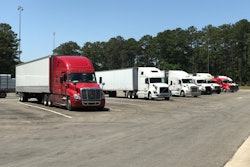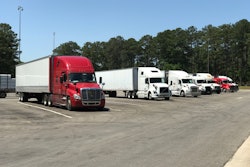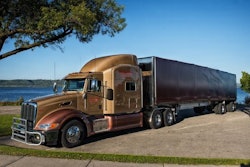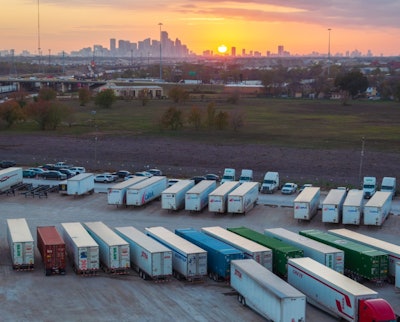
Trent Cameron has been running the roads across the United States of late. "I’m on the road 24/7 trying to find places for us to anchor our next Outpost," he said, making reference to the new name for a company that got its start in November 2021 as Semi-Stow. Cameron was among founders with a vision to deliver on the truck parking needs of individual owner-operators, small fleet owners and even large fleets.
He's seen the truck parking crisis up close on those runs, with operators "parked in unsecure locations, exit ramps, facilities with no security," he said. Dedicated, publicly available truck parking facilities even in a freight hub like Kansas City, he added, are pretty well limited to the traditional truck stops in the area. "That's bananas in a market with that much freight volume flowing through it."
The rebrand of Semi-Stow is official as of today, Tuesday, April 23, 2024, with a brand-new Outpost website for bookings at any one of the 18 properties the company currently manages itself, representing 8,000 parking spaces between them. Website users can also connect with partner managers of 20 additional yards advertised there, most with varying daily, monthly and annual options for booking space.
 Outpost's Trent Cameron started his working career in the tech world. Before Semi-Stow and now Outpost, he'd worked with a tech start-up in their transportation- and trucking-focused practice, where he gained an intimate understanding of the complexities and challenges. More elementally, "I love being in the business," he said. "It’s the best. I think the people are really incredible in this industry."
Outpost's Trent Cameron started his working career in the tech world. Before Semi-Stow and now Outpost, he'd worked with a tech start-up in their transportation- and trucking-focused practice, where he gained an intimate understanding of the complexities and challenges. More elementally, "I love being in the business," he said. "It’s the best. I think the people are really incredible in this industry."
Growth is enabled in part by a new $12.5 million infusion of funding raised by GreenPoint Partners with support from Speedwagon Capital Partners. (The growth will also be fueled by Outpost’s management of a $500 million industrial outdoor storage investment portfolio launched by GreenPoint last year, the company said.)
[Related: New site to reserve truck parking is something of an 'AirBNB' for facilities]
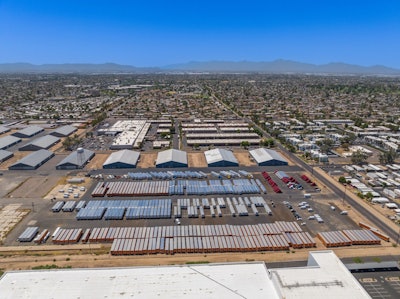 Pictured here is one of three Outpost yards currently in the Phoenix, Arizona, area.
Pictured here is one of three Outpost yards currently in the Phoenix, Arizona, area.
Shared-terminal future for fleets large and small?
There's more to the network than just addressing the obvious truck parking need around the nation, part of the reason for the company rebrand to Outpost. It's a given that "transportation is changing and evolving in many ways," said Cameron. Yet what's also "going to remain universally true is there’s a ton of infrastructure required to support the industry. We think that Outposts are the future of that support" as places "where trucking companies of all sizes can come together to access parking and other shared services."
For one-truck owner-operators and other small fleets, Outpost aims to "give those small carriers the same leg up that the large companies get" with "access to real estate across the country," he said, serving as "carrier-agnostic terminals" with not only parking but office space and maintenance and warehousing facilities.
Outpost's future, he believes, will "rely on our ability to offer all those services in one package." For small fleets, it could enhance an owner's ability to expand into a new market without the need to directly invest in real estate there. Cameron's conversations with smaller entities over recent years have underscored "strong convictions about the tight connections with their customers," he added, yet also acknowledgment of the limitation presented by expensive real estate, when it comes to new terminals.
"We want to position ourselves as an enabler of trucking companies to be able to expand their operations," he said, bringing "less separation of the very large companies and the small ones."
Larger fleets can benefit, too, though, to be sure. Prior to the Outpost rebrand, Semi-Stow itself already served fleet needs in varying degrees of names like Landstar, Werner, Prime Inc., FirstFleet and others. Success of big fleets' own terminal establishments often enough depend on a single customer contract, Cameron said. Loss of that contract can leave the company with a big real estate liability on the balance sheet.
"To the extent we can give them a more flexible way to operate," he said, to "scale up or down depending on need," he feels is a win for Outpost as it grows.
[Related: Trucking's best defense against predatory towing: A step-by-step guide]
Cameron's motivated to be more than just an OTR parking resource. He told the story of a Los Angeles area small fleet that was instrumental in the decision to open up the Semi-Stow platform to partner facilities beyond just its fully managed, owned sites. Semi-Stow had been in full operation for just a month or two with early sites in Houston and Laredo, Texas. The fleet owner called the company "asking me if we had a location anywhere" in or near Los Angeles, Cameron said.
The owner was about to be kicked off the lot he'd used, given it was being newly leased to a major carrier, and Cameron could hear the desperation in his voice. “I’ve been calling everywhere for weeks,” the five-six-truck owner-operator said, "and I just can’t find anywhere to park my trucks."
The Semi-Stow team at the time dropped what they were doing as Cameron decided, "We're going to go find this guy a parking lot," he said. "And we did," through another real estate owner in the area. (Outpost currently shows one partner site in Fontana, California, due east of Los Angeles proper.)
The experience led to encouragement of other property owners to "advertise their lots on our website," Cameron said, and the story likewise illustrates another problem for small fleets as they grow beyond the limits of their real estate. Everybody "talks about the overnight parking problem" for truckers OTR, he added. Yet equally problematic can be just where to "store the truck when you're at home. ... We think that’s equally a problem" in many places.
Partner sites can't be directly reserved through the Outpost website, but it serves as a connection engine for property owners and potential users in those locales. Almost all sites "have at the very least monthly" use options, and most "have daily parking as well," said Cameron.
Find more at the brand-new Outpost.us website.
[Related: Truck parking at home: When local governments say no]



